
![]()
Search the Journey to Forever website – click HERE
|
Journey to Forever: Make a donation |
Navigation
Contact usTo Keith Addison Handmade Projects |
School gardening resources
School gardens
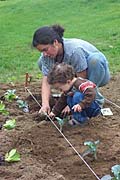 KidsGardening! -- "helping young minds grow", US National Gardening Association: Garden Resources, Gardening for Families, Family Resource Room, Teachers' Room, Online Teachers' Course, Classroom Projects, Kidsgardening FAQs.
KidsGardening! -- "helping young minds grow", US National Gardening Association: Garden Resources, Gardening for Families, Family Resource Room, Teachers' Room, Online Teachers' Course, Classroom Projects, Kidsgardening FAQs.
http://www.kidsgardening.com/
KidsGarden News from the National Gardening Association -- Free monthly email newsletter -- articles, activities, and resources for educators implementing school gardens, updates of available grants, gardening resources, youth gardening conferences, more. Subscribe online:
http://www.garden.org/subscriptions/
Read the current issue online:
http://www.kidsgardening.org/2007.kids.garden.news/current.html
Back issues:
http://www.kidsgardening.org/kgn.html
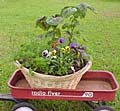 Gardening in Containers: Growing in Small and Soilless Spaces, National Gardening Association, Growing Ideas Classroom Projects, 2003 -- Detailed practical guide online, designed for teachers to use in school gardening projects, useful for anyone. Background, creative containers, plants and schemes, plants for container gardens, special container projects, recommended web sites, books and tools. Chart of vegetables, showing good container varieties, container size, final plant spacing, light requirement, minimum soil depth. Also herbs, annual flowers, bulbs, perennials. 3 web pages, 5,000 words. Online:
Gardening in Containers: Growing in Small and Soilless Spaces, National Gardening Association, Growing Ideas Classroom Projects, 2003 -- Detailed practical guide online, designed for teachers to use in school gardening projects, useful for anyone. Background, creative containers, plants and schemes, plants for container gardens, special container projects, recommended web sites, books and tools. Chart of vegetables, showing good container varieties, container size, final plant spacing, light requirement, minimum soil depth. Also herbs, annual flowers, bulbs, perennials. 3 web pages, 5,000 words. Online:
http://www.kidsgardening.com/growingideas/PROJECTS/feb03/pg1.html
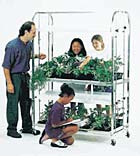 Garden Indoors with GrowLab -- National Gardening Association. GrowLab is a National Science Foundation-funded, K-8 plant-based instructional program that uses plants as a springboard for investigative, student-centred learning. The centrepiece is the K-8 curriculum guide, GrowLab: Activities for Growing Minds. The horticultural guide, GrowLab: A Complete Guide to Gardening in the Classroom, provides further guidance and inspiration for using plants to enrich classroom learning. Students become scientifically literate by engaging in meaningful inquiries of the natural world.
Garden Indoors with GrowLab -- National Gardening Association. GrowLab is a National Science Foundation-funded, K-8 plant-based instructional program that uses plants as a springboard for investigative, student-centred learning. The centrepiece is the K-8 curriculum guide, GrowLab: Activities for Growing Minds. The horticultural guide, GrowLab: A Complete Guide to Gardening in the Classroom, provides further guidance and inspiration for using plants to enrich classroom learning. Students become scientifically literate by engaging in meaningful inquiries of the natural world.
http://www.kidsgardeningstore.com/ca-growlab.html
Sample activities: Why Root for Roots?
http://www.kidsgardening.com/2006.kids.garden.news/july/pg2.html
Journey to the Center of a Seed
http://www.kidsgardening.com/2006.kids.garden.news/jan/pg2.html
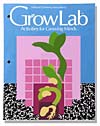 "Grow Lab: Activities for growing minds", National Gardening Association. Whether you're growing in a greenhouse, in a GrowLab® Indoor Light Garden, or on a windowsill, Activities for Growing Minds will help spark students' curiosity about plants and invite them to think and act like scientists. Developed by the National Gardening Association and written and field-tested by educators, this complete curriculum uses fun, illustrated activities to explore plant life cycles, examine plant diversity, and investigate the interdependence of plants, humans, and other living and nonliving things. Meets National Science Standards; 307 pages; gr K-8. Buy from Amazon.com: Grow Lab: Activities for Growing Minds
"Grow Lab: Activities for growing minds", National Gardening Association. Whether you're growing in a greenhouse, in a GrowLab® Indoor Light Garden, or on a windowsill, Activities for Growing Minds will help spark students' curiosity about plants and invite them to think and act like scientists. Developed by the National Gardening Association and written and field-tested by educators, this complete curriculum uses fun, illustrated activities to explore plant life cycles, examine plant diversity, and investigate the interdependence of plants, humans, and other living and nonliving things. Meets National Science Standards; 307 pages; gr K-8. Buy from Amazon.com: Grow Lab: Activities for Growing Minds
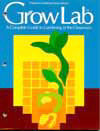 "Grow Lab: A complete guide to gardening in the classroom", National Gardening Association, Revised Edition
"Grow Lab: A complete guide to gardening in the classroom", National Gardening Association, Revised Edition
Everything you and your students need to know about indoor gardening in this comprehensive book. Setting up an indoor garden, planning and planting, choosing vegetables, herbs, and flowers to grow indoors, maintaining a healthy growing environment, special gardening projects and more. This well-written, easy-to-follow resource will guide you to growing success. 112 pages. Buy from Amazon.com: Grow Lab: A complete guide to gardening in the classroom
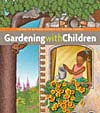 Gardening with Children (Brooklyn Botanic Garden All-Region Guide) by Monika Hanneman, Patricia Hulse, Brian Johnson, Barbara Kurland, Tracey Patterson, Sam Tomasello (Illustrator), Brooklyn Botanic Garden, 2007, 120 pages, ISBN-10: 1889538302
Gardening with Children (Brooklyn Botanic Garden All-Region Guide) by Monika Hanneman, Patricia Hulse, Brian Johnson, Barbara Kurland, Tracey Patterson, Sam Tomasello (Illustrator), Brooklyn Botanic Garden, 2007, 120 pages, ISBN-10: 1889538302
A handbook on gardening with kids for parents, teachers and community gardeners, from Brooklyn Botanic Garden, home of the oldest children's garden in North America. Covers the basics on growing common plants from seed, with scores of fun projects that can awaken a sense of wonder about the natural world, indoors and outdoors, whether in a big garden or a windowsill planter. Great illustrations. Buy from Amazon.com: Gardening with Children
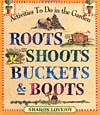 Roots, Shoots, Buckets & Boots: Gardening Together with Children by Sharon Lovejoy, Workman Publishing, 1999, 176 pages, ISBN-10: 0761110569
Roots, Shoots, Buckets & Boots: Gardening Together with Children by Sharon Lovejoy, Workman Publishing, 1999, 176 pages, ISBN-10: 0761110569
A gardening adventure, weaving garden planning, plant care, nature explorations, science, art, and storytelling into creative garden themes. Nine concepts for theme gardens, clearly defined yet flexible and adaptable, with loads of appeal for kids. Fairy gardens, edible pizza gardens, sunflower houses, flower mazes, a moon garden and more, along with basic plant care and an organic approach, proper composting, tips and ideas for adults to share with children. Each theme includes a list of plants for different zones and garden projects covering history, nutrition, science, cooking, ecology and art. Children get to know the soil, learn about organic gardening, and discover why compost is "garden health food". Projects are quick, do-able and fun. Buy from Amazon.com: Roots, Shoots, Buckets & Boots
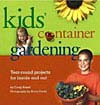 Kids Container Gardening: Year-Round Projects for Inside and Out by Cindy Krezel (Author), Bruce Curtis (Photographer), Ball Publishing, 2005, 88 pages, ISBN-10: 1883052432
Kids Container Gardening: Year-Round Projects for Inside and Out by Cindy Krezel (Author), Bruce Curtis (Photographer), Ball Publishing, 2005, 88 pages, ISBN-10: 1883052432
17 gardening projects with inherent kid appeal, from growing a hanging basket of vegetables to creating a water garden complete with fish. Lists what's needed for each project, plus simple facts and insights on plants and gardening. Covers what plants need, how to handle them, and climate. Great guide for parents and teachers. For children in grades 3-5. Buy from Amazon.com: Kids Container Gardening
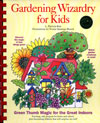 Gardening Wizardry for Kids by L. Patricia Kite, Barrons, 1995, ISBN 0-8120-1317-4
Gardening Wizardry for Kids by L. Patricia Kite, Barrons, 1995, ISBN 0-8120-1317-4
"Green thumb magic for the great indoors" -- over 300 indoor projects, with colorful illustrations, uses cheap materials available in any household. With folklore and legends, seed catalog section, glossary, further reading list. Buy from Amazon.com: Gardening Wizardry for Kids
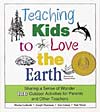 Teaching Kids to Love the Earth -- The activities in this book were developed and field-tested at environmental learning centers, schools, and nature centers. Each activity encourages kids to experience the natural world with a sense of curiosity, discovery, and passion. Resources are included with each activity. You'll turn to this exceptional book time and again as you teach students about the outdoors and the environment. Buy from Amazon.com: Teaching Kids to Love the Earth
Teaching Kids to Love the Earth -- The activities in this book were developed and field-tested at environmental learning centers, schools, and nature centers. Each activity encourages kids to experience the natural world with a sense of curiosity, discovery, and passion. Resources are included with each activity. You'll turn to this exceptional book time and again as you teach students about the outdoors and the environment. Buy from Amazon.com: Teaching Kids to Love the Earth
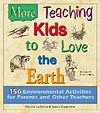 More Teaching Kids to Love the Earth by James Kasperson (Author), Marina Lachecki (Author), Karlyn Holman (Illustrator), Pfeifer-Hamilton Pubs, 1994, ISBN-10: 1570250405
More Teaching Kids to Love the Earth by James Kasperson (Author), Marina Lachecki (Author), Karlyn Holman (Illustrator), Pfeifer-Hamilton Pubs, 1994, ISBN-10: 1570250405
Expands on the concepts first presented in the best-selling Teaching Kids to Love the Earth, with 156 new activities that encourage children to love, trust, and nurture the earth. The stories about kids in urban, suburban, and rural settings invite children to live in partnership with their planet. "More Teaching Kids to Love the Earth introduces the skills young people need as they face more environmental problems than any generation in history." Buy from Amazon.com: More Teaching Kids to Love the Earth
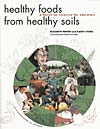 Healthy Foods from Healthy Soils -- Help children understand how their food choices affect not only their own health, but also farmers, the environment, and your local community. This book invites you and your students to discover where food comes from, how our bodies use food, and what happens to food waste. You’ll participate in the ecological cycle of food production, compost formation, and recycling back to the soil. Includes background information and a guide for integrating activities into the classroom. 256 pages; gr K-6. Buy from Amazon.com: Healthy Foods from Healthy Soils
Healthy Foods from Healthy Soils -- Help children understand how their food choices affect not only their own health, but also farmers, the environment, and your local community. This book invites you and your students to discover where food comes from, how our bodies use food, and what happens to food waste. You’ll participate in the ecological cycle of food production, compost formation, and recycling back to the soil. Includes background information and a guide for integrating activities into the classroom. 256 pages; gr K-6. Buy from Amazon.com: Healthy Foods from Healthy Soils
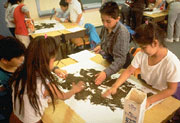 The Life Lab Science Program has been working in science and environmental education in the US for 30 years. Life Lab's award winning curricula and programs help schools develop gardens where children can create "living laboratories" for the study of the natural world. Since developing the first Life Lab school garden in Santa Cruz in 1978, Life Lab has worked with over 1400 schools across the United States.
The Life Lab Science Program has been working in science and environmental education in the US for 30 years. Life Lab's award winning curricula and programs help schools develop gardens where children can create "living laboratories" for the study of the natural world. Since developing the first Life Lab school garden in Santa Cruz in 1978, Life Lab has worked with over 1400 schools across the United States.
http://www.lifelab.org/index.php
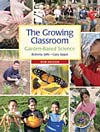 "The Growing Classroom: Garden-Based Science" by Roberta Jaffe, Gary Appel, Revised Edition 2007 -- This is the Life Lab Science Program's award winning resource book containing step-by-step instructions for setting up a garden-based science program and outdoor classroom activities. Topics include working together in the garden, growing, nutrients, garden ecology, climate, nutrition, gardening tips, and food choices. Four major sections: Breaking Ground, Science Units, Nutrition Unit, and a Resource Section, 160 garden-based activities using an indoor or outdoor garden laboratory, 35 different nutrition-related activities. New edition includes updated content and an expanded gardening tips section. Comes with some glowing recommendations — "a teacher and NGA staff favorite!" 496 pages.
"The Growing Classroom: Garden-Based Science" by Roberta Jaffe, Gary Appel, Revised Edition 2007 -- This is the Life Lab Science Program's award winning resource book containing step-by-step instructions for setting up a garden-based science program and outdoor classroom activities. Topics include working together in the garden, growing, nutrients, garden ecology, climate, nutrition, gardening tips, and food choices. Four major sections: Breaking Ground, Science Units, Nutrition Unit, and a Resource Section, 160 garden-based activities using an indoor or outdoor garden laboratory, 35 different nutrition-related activities. New edition includes updated content and an expanded gardening tips section. Comes with some glowing recommendations — "a teacher and NGA staff favorite!" 496 pages.
Sample Lessons: Space Travelers -- Students work in small groups to explore the composition of soil:
http://lifelabstore.org/images/pdfs/spacetravelers.pdf
Six of One, Half Dozen of the Other -- Groups of students use multiple senses to find and classify contrasting objects in the natural environment:
http://lifelabstore.org/images/pdfs/sixofone.pdf
Buy from Life Lab's Online Store:
http://lifelab.org/index.php?page=curriculum#tgc
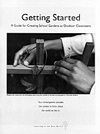 "Getting Started: A Guide for Creating School Gardens as Outdoor Classrooms", Life Lab Science Program, 1997 -- Nearly 20 years of world-wide school garden experience with the Life Lab Science Program distilled into a concise 50-page guide that asks and answers most questions you need to consider for creating an outdoor classroom garden. Covers your garden's purpose, school staff, volunteers and students, connecting with the curriculum, site selection and design, theme gardens, fund-raising, public awareness and more. Free to California school teachers. Order online from Life Lab:
"Getting Started: A Guide for Creating School Gardens as Outdoor Classrooms", Life Lab Science Program, 1997 -- Nearly 20 years of world-wide school garden experience with the Life Lab Science Program distilled into a concise 50-page guide that asks and answers most questions you need to consider for creating an outdoor classroom garden. Covers your garden's purpose, school staff, volunteers and students, connecting with the curriculum, site selection and design, theme gardens, fund-raising, public awareness and more. Free to California school teachers. Order online from Life Lab:
http://lifelab.org/index.php?page=curriculum#gsg
A Square Yard in the School Yard -- Detailed guide for teachers to start Square Foot Gardens for their students, even with no gardening experience -- this Teacher's Kit tells you all.
http://www.farmerbrown.org/manual.html
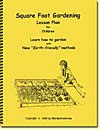 Square Foot Gardening: Lesson Plan for Children -- Learn how to garden with new "Earth-friendly" methods
Square Foot Gardening: Lesson Plan for Children -- Learn how to garden with new "Earth-friendly" methods
Children's Lesson Plan and Teaching Guide for parents or teachers, for home or school, for ages 8 to 18. Projects include backyard garden, family history, Internet, field trips, self discovery, science project, vocabulary skills, math challenges, skill activities. 55 pgs. Illustrated. Sample lesson pages online.
http://www.squarefootgardening.com/html/catalog/book2.html
School gardening, For Kids Only -- Square Foot Gardening Kids games, School Garden Contest, Teaching advice.
http://www.squarefootgardening.com/html/body_for_kids_only.html
Teaching Square Foot Gardening -- Recommended teaching references, teaching props, what-is and how-to handouts for students.
http://www.squarefootgardening.com/html/body_what_s_new7.html
KinderGARDEN by Aggie Horticulture, Texas, is a great resource for parents and teachers, many good resources and links for teaching children gardening. Fun Page for Kids, Introduction to School Gardens, Step-by-Step Guides, Indoor Growing Science Center, Ideas and Curricula, Nutritional Benefits of School Gardens, Resources and more. Good book list. Special Tips for Gardening with Kids: "Young kids have a very short attention span. Digging holes is one thing that seems to hold endless fascination... Instant gratification helps a lot. Plant radishes even if you don't like them -- they come up in three or four days... Growing their own will generally get kids to try eating things they otherwise wouldn't walk into the same room with... GETTING DIRTY IS AN INTEGRAL PART OF GROWING UP."
http://aggie-horticulture.tamu.edu/kindergarden/kinder.htm
Great Plant Escape -- On-line interactive plant science curriculum for grades 4 and 5, from Chicago Urban Gardening, University of Illinois. Great educational site, fun and adventure while uncovering the world of plants. Parallel resources for teachers to guide the lessons as they unfold. Each of the lessons is interdisciplinary, designed to introduce students to plant science and increase their understanding of how foods grow. Includes maths, science, language arts, social studies, music and art. Students can work independently or in groups. "How Did Your Lettuce Grow? That's great. Your lettuce is healthy. Now we can go on and make a tossed salad." Clever, well-implemented. See also The Adventures of Squirmin' Herman the Worm, Composting for schools.
http://www.urbanext.uiuc.edu/gpe/index.html
"Gardening with Children Resource Guide", Ohio State University Master Gardener Program. A study of elementary school teachers in the US found that they seldom used school gardens -- though 84% felt that garden-related activities enhanced learning. One explanation was that teachers were unaware of educational resources to assist with garden learning. This manual is a resource guide for anyone interested in beginning or expanding children's gardening programs. The first section offers tips from two experts on designing gardens for kids and planning children's programs. The second section describes programs developed for children. The final section is a reference list of books, suppliers, web-sites, and organizations. 44-page Adobe Acrobat file.
http://www.hcs.ohio-state.edu/mg/pdf/youth.pdf
City Farmer's web page on School Gardens -- Useful list of resources and information from City Farmer -- Canada's Office of Urban Agriculture, also Food Gardening in Schools, Nutrition and School Gardens, Education and School Gardens, Composting Activities For Children, The Case For More High School Gardens.
http://www.cityfarmer.org/schgard15.html
"School Garden Guidelines -- How to Teach Children about Nutrition and the Environment", City Farmer, Canada's Office of Urban Agriculture.
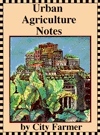 From 1984 to 1986 hundreds of children and adults worked together to build a new playground and school garden at Lord Roberts Elementary School in Vancouver's densely populated West End. City Farmer took part in the project and published this 16-page booklet based on their experience. "Teachers have found that children involved in gardening projects are more interested in nutrition and food labels. The garden also provides a link with families who are often influenced by the children to grow food at home -- Nutritionally, a school garden project is a winner!" From City Farmer:
From 1984 to 1986 hundreds of children and adults worked together to build a new playground and school garden at Lord Roberts Elementary School in Vancouver's densely populated West End. City Farmer took part in the project and published this 16-page booklet based on their experience. "Teachers have found that children involved in gardening projects are more interested in nutrition and food labels. The garden also provides a link with families who are often influenced by the children to grow food at home -- Nutritionally, a school garden project is a winner!" From City Farmer:
http://www.cityfarmer.org/
"School Year Gardens: A Toolkit for High Schools to Grow Food from September to June" by Paris Marshall Smith and Arzeena Hamir, Richmond Fruit Tree Project, BC, Canada, 2007 -- "Imagine growing greens in the dead of winter and sharing the bounty with a group of eager students. Once harvested, the food from the garden becomes a resource for the kitchen, the next stop in the seed to table cycle. Students have the opportunity to further their garden experience by learning about their taste palates, culturally diverse food preparation techniques, historical methods of food processing (fermentation, canning, pickling), nutrition and food combining and, of course, the pleasure of eating and working together." Download (30MB PDF):
http://www.richmondfruittree.com/Toolkit.pdf
Green Teacher -- Education for Planet Earth -- "We're not slick... just resource-full." Based in Toronto, Green Teacher magazine was produced by and for educators to enhance environmental and global education across the curriculum at all grade levels. Fifty pages of ideas and activities, four times a year -- all issues from 1986 to 2000 free online. Each issue contains: Perspective articles -- ideas for rethinking education in light of environmental and global problems; Practical articles -- reports of what successful teachers, parents, and schools are doing; Ready-to-use activities -- cross-curricular activities for various grade levels; Resource listings and reviews -- evaluations of dozens of new books, kits, games and other resources.
http://www.web.net/~greentea/
 Garden Organic for Schools, by Garden Organic, Britain's Organic Association (the HDRA) -- Introduces children to the pleasures of sowing, planting, growing, nurturing and eventually harvesting the food they eat, using organic methods. Practical help for schools, with everything related to the curriculum. "Today's children could be forgiven for thinking that bananas come from boxes, peas come frozen in packets, and tomatoes from tins. The real origin of these foods -- that they come from living plants which grow in the soil -- is not apparent." Advice & Resources, Learning Zone, School reports, Teaching Zone, Facts & Figures, Fun Zone, This half-term, Noticeboard, (UK) National Curriculum, plus the Garden Organic for Schools project, a nationwide campaign which helps children grow vegetables at school and learn more about their food.
Garden Organic for Schools, by Garden Organic, Britain's Organic Association (the HDRA) -- Introduces children to the pleasures of sowing, planting, growing, nurturing and eventually harvesting the food they eat, using organic methods. Practical help for schools, with everything related to the curriculum. "Today's children could be forgiven for thinking that bananas come from boxes, peas come frozen in packets, and tomatoes from tins. The real origin of these foods -- that they come from living plants which grow in the soil -- is not apparent." Advice & Resources, Learning Zone, School reports, Teaching Zone, Facts & Figures, Fun Zone, This half-term, Noticeboard, (UK) National Curriculum, plus the Garden Organic for Schools project, a nationwide campaign which helps children grow vegetables at school and learn more about their food.
http://www.gardenorganic.org.uk/schools_organic_network/
Garden Organic:
http://www.gardenorganic.org.uk/
Organic Gardening books:
http://www.gardenorganic.org.uk/publications/books.php
Garden Organic guides:
http://www.gardenorganic.org.uk/publications/guides.php
The Organic Gardening Catalogue, a joint venture by Garden Organic and Chase Organics in Hersham, Surrey, UK, suppliers to organic gardeners for over 80 years. A great range of seeds, fertilisers, composts, pest controls, weed controls, tools and books.
http://www.organiccatalog.com/catalog/
The Soil Association's "Food for Life" Partnership is a network of schools and communities across the UK committed to transforming food culture. Whole-school approach to food provision and education through: Food for Life Action Packs providing practical steps towards improving school meals; Food for Life Curriculum Packs providing a wide range of engaging and informative activities for both key stage one and two; Food for Life Workshops to engage children in healthy food and where it comes from; Visits to working organic farms to provide life-changing experiences for children. "Together we will revolutionise school meals, reconnect young people with where their food comes from and inspire families to cook and grow food."
http://www.foodforlife.org.uk/
Learning through Landscapes helps schools and early years settings make the most of their outdoor spaces for play and learning. School grounds are essential to children's learning and development, providing opportunities for healthy exercise, creative play, making friends, learning through doing and getting in touch with the natural world. We believe all children have the right to enjoy and benefit from well designed, managed and used school grounds.
http://www.ltl.org.uk/
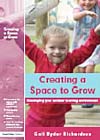 Creating a Space to Grow, by Gail Ryder Richardson, David Fulton Publishers, 2005, ISBN 1-84312-304-5, 91pages. This book guides you through the process of changing and developing the outdoor environment of your early years setting to maximise the learning potential that these areas can offer. Packed full of strategies and ideas for enhancing outdoor areas, it will enable you to recognise the true value that outdoors spaces can have on a child’s educational development through: Practical real-life case studies and examples; Focusing on core values that highlight the importance and benefits of outdoor play; Step-by-step photocopiable prompt sheets that guide you through each stage of improving your outdoor areas. Buy from Amazon.com: Creating a Space to Grow
Creating a Space to Grow, by Gail Ryder Richardson, David Fulton Publishers, 2005, ISBN 1-84312-304-5, 91pages. This book guides you through the process of changing and developing the outdoor environment of your early years setting to maximise the learning potential that these areas can offer. Packed full of strategies and ideas for enhancing outdoor areas, it will enable you to recognise the true value that outdoors spaces can have on a child’s educational development through: Practical real-life case studies and examples; Focusing on core values that highlight the importance and benefits of outdoor play; Step-by-step photocopiable prompt sheets that guide you through each stage of improving your outdoor areas. Buy from Amazon.com: Creating a Space to Grow
WORKOUT -- The Secondary School Grounds Toolkit, Learning through Landscapes, 2005, ISBN: 187286533X. This Toolkit is aimed at all those involved with improving the use, design and management of secondary school grounds, including students, teachers, heads, governors, parents and school grounds professionals. It particularly focuses on physical changes to the school grounds, whether these are whole-site development plans or improvements to small, defined areas. Folder containing three booklets, giving step-by-step guidance on improving secondary school grounds; 12 full-colour case study cards; 24 lesson-ready activity sheets covering all stages of the process on a CD Rom; Inspirational images on a CD Rom; A ready-made PowerPoint show to inspire staff, parents and governors. From Learning through Landscapes:
http://www.ltl.org.uk/schools_and_settings/resources/
publications.htm?searchsub=1&item=413
Growing Schools is a UK government programme to encourage and inspire all schools (nursery, primary, secondary and special) to use the outdoor classroom, within and beyond the school grounds, as a context for learning across the curriculum. Focuses on food, farming and the countryside. Schools can use the site to find information on health and safety, funding sources, published research, training, resource materials, places to visit and news and events. Case studies on outdoor learning and school grounds development.
http://www.teachernet.gov.uk/growingschools/
Virtual Growing Schools Garden -- A new virtual version of the Growing Schools Garden designed by Chris Beardshaw has been launched, packed full of useful resources and advice on how to create a garden of your own.
http://www.thegrowingschoolsgarden.org.uk/
Grow your own Grub -- a step by step guide for teachers who want to run a growing project in their school. This project involves growing four different vegetables -- tomatoes, carrots, peas and spinach -- that can be used to make a healthy meal. This is done over three separate sessions over the main growing season between March and July. The project is designed to finish just before the end of the summer term. The children's parents can be invited to join in the final session which involves harvesting and food-tasting.
http://www.growinggrub.co.uk/
"Pachamama: Our Earth -- Our Future" by Young People of the World, 1999, Trafalgar Square, ISBN 0237521199
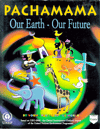 "Pachamama" is an Inca word meaning "mother earth" and implying harmony with nature -- something the hundreds of Young People of the World who authored this book strongly feel is missing in the way we live today. They warn young readers that if they're as reckless as their parents have been in caring for the environment "the good ship Planet Earth will crash sometime in the not too distant future". A good introduction by and for young people to the environmental challenges of the 21st century. Based on the United Nations Environmental Program's recent Global Environment Outlook 2000 report, it describes both the state of the world's environment and what's being done about it, especially by youth. Information, case studies, games and topics for classroom discussion of major environmental issues, complemented by a teacher's guide and suggestions to youth for taking action. Buy from Amazon.com: Pachamama
"Pachamama" is an Inca word meaning "mother earth" and implying harmony with nature -- something the hundreds of Young People of the World who authored this book strongly feel is missing in the way we live today. They warn young readers that if they're as reckless as their parents have been in caring for the environment "the good ship Planet Earth will crash sometime in the not too distant future". A good introduction by and for young people to the environmental challenges of the 21st century. Based on the United Nations Environmental Program's recent Global Environment Outlook 2000 report, it describes both the state of the world's environment and what's being done about it, especially by youth. Information, case studies, games and topics for classroom discussion of major environmental issues, complemented by a teacher's guide and suggestions to youth for taking action. Buy from Amazon.com: Pachamama
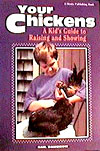 "Your Chickens: A Kid's Guide To Raising And Showing" by Gail Damerow, 1993, Storey Books, ISBN 0882668234
"Your Chickens: A Kid's Guide To Raising And Showing" by Gail Damerow, 1993, Storey Books, ISBN 0882668234
Raising healthy chickens for kids: what to feed them, where do you keep them, chickens as pets, and more. Clearly written and easy to understand general guide aimed at kids. Gail Damerow is the editor of Rural Heritage magazine and the author of eight books, including Chickens in Your Backyard, and Ducks and Geese in Your Backyard. Buy from Amazon.com: Your Chickens: A Kid's Guide To Raising And Showing
Chickscope 1.5: Resources: From Egg To Chick -- Make an incubator out of two cardboard boxes or plywood -- this online schools biology project uses commercial heating elements or light bulbs in porcelain sockets. Expect about a 50% success rate with 3 dozen eggs (commercial incubators: about 80%).
http://chickscope.beckman.uiuc.edu/resources/egg_to_chick/incubator.html
Children's Butterfly Site, from the US Geological Survey's Midcontinent Ecological Science Center -- a coloring page of the life cycle of the Monarch, frequently asked questions about butterflies and moths, Butterfly and Moth Life Cycle, books and videos including Butterfly Gardens, Activities with Butterflies Teacher Resources, photo galleries, Ask a Question about Butterflies, links and resources and more, including translations into French, German, Spanish, Dutch, Italian.

Apprentice butterfly
(Keith Addison)
http://www.mesc.nbs.gov/butterfly/Butterfly.html
The Butterfly WebSite -- Photo gallery, Kids' Stuff, learn how to plant a butterfly garden, nature education, take a field trip, find a pen-pal, chat with other butterfly-lovers, articles, resources and more.
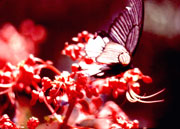
Ex-caterpillar (Keith Addison)
http://butterflywebsite.com/
Butterfly gardening and resources from KidsGardening!, National Gardening Association -- ButterflyLab, butterfly feeder, butterfly observation, live monarch butterfly collections, butterfly books. From the Gardening with Kids Store:
http://www.kidsgardeningstore.com/butterflygardens.html
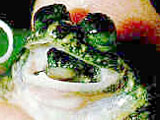 Frogland -- this is a great website, full of fun and whackiness -- lots to learn here, without your even noticing that you're learning! "Serving you Froggy Silliness since August, 1995!" -- by Friend of Frogs Dorota of Frogland. Froggy Things to Do -- Stupid Frog Joke of the Day -- Frog of the Month -- WEIRD Frog Facts -- Save Our Frogs -- Frog FAQ -- Froggy Coloring Book -- International Frogs and much else, including Teachers Corner. This award-winning site has had nearly a million visitors.
Frogland -- this is a great website, full of fun and whackiness -- lots to learn here, without your even noticing that you're learning! "Serving you Froggy Silliness since August, 1995!" -- by Friend of Frogs Dorota of Frogland. Froggy Things to Do -- Stupid Frog Joke of the Day -- Frog of the Month -- WEIRD Frog Facts -- Save Our Frogs -- Frog FAQ -- Froggy Coloring Book -- International Frogs and much else, including Teachers Corner. This award-winning site has had nearly a million visitors.
http://allaboutfrogs.org/froglnd.shtml
See: School composting
Trees and forests -- resources for schools
See also:
Organic gardening
Composting
City farms
Small farms
Trees, soil and water
Seeds of the world